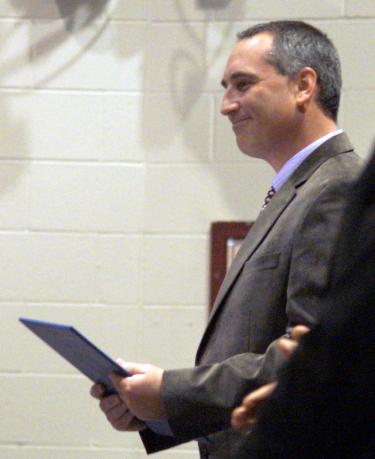Corey to become super elsewhere as BKW loses longest leader
BERNE — High school Principal Brian Corey will leave Berne-Knox-Westerlo in January to become the superintendent of a small rural school district in Schoharie County.
Corey, 40, has been in his position for three years, serving in the past as BKW’s elementary school principal and as a music teacher. His job will be open in the middle of the school year, likely filled by an interim principal who will serve into the following school year. But, school board President Joan Adriance noted Tuesday, the board had not had a discussion since Corey’s appointment on Dec. 4.
Corey is the longest serving administrator in a rural district that has been plagued with leadership turnovers in recent years.
Berne-Knox-Westerlo, which has almost 900 students, is itself in the process of looking for a new superintendent, now operating under its second interim leader in two years, Joseph Natale.
“It’s a critical leadership position in a school district,” Natale said of a high school principal. “I think it’s important that the new superintendent be able to do the research and look for a principal that would be best to fit his goals and objectives.”
“I think the reason we have a second-year interim superintendent is that we want to really figure out what direction we want to go in,” said Adriance. “We made a lot of changes this year…I think that finding that person and finding someone who’s committed to our district, and wants to stay in our district, will bring the leadership we need at the next level of administration.”
Jefferson has 287 students and one principal for all grades. Corey said he will learn more about the district as he starts there before forging goals in his work.
Asked why he didn’t take the superintendent job at Berne-Knox-Westerlo, Corey said the opportunity in Jefferson arose before it did at BKW.
“I know it’s a very time-consuming and challenging interview process, so, in my mind, I was starting the process,” Corey said. “I am fortunate to be offered the position and I didn’t necessarily know if I would be offered that position. I know some people search for these positions for many years.”
If the superintendent position at BKW had been open to applicants earlier, Corey said he probably would have applied.
“It wasn’t [open] and I didn’t take it as a negative,” he said. “In fact, I don’t think it was a bad thing that we have an interim superintendent. In fact, it was probably a smart decision.”
The board has recently begun meeting with representatives from the Capital Region Board of Cooperative Educational Services to outline what should go into the marketing materials as Berne-Knox-Westerlo searches for a new permanent superintendent, Adriance said. Natale’s time is scheduled to end around the close of the school year.
Robert Bentley, chair of BKW’s social studies department, a long-time faculty member, and new president of the BKW Teachers’ Association, said interim administrators make teacher evaluations more difficult.
“The people who are working side by side every day know you and understand what your teaching styles are and what your strengths and weaknesses are, so a guy like Brian Corey, who’s seen, for example, this year a teacher once or twice already and seen them in the past, can really do a much more thorough job evaluating them.”
The district has a new, part-time business official this year, and its athletic director and dean of students positions have turned over in the past year, too, with John Metallo now serving as interim assistant principal and athletic director. The elementary school principal, Audrey Roettgers, has been working in the district for just over a year, replacing another principal who was at BKW less than a year.
Corey said he will have roughly half of the teacher evaluations finished for this school year before he leaves the district. While he acknowledged that his past with the district helped with the evaluation process, he said he has faith in the experience of the interim officials to recognize good teachers.
“We’ll follow the direction they take us in,” Bentley said of the school board. “We always hope to have a permanent position, but it’s always very difficult in the middle of the school year to find somebody.”
He and Adriance said BKW’s situation with administraors can be characterized as a transition period.
“I think it’s just a snapshot of education in general,” Bentley said of BKW’s current state of interim leadership. “It’s a transitory kind of job. We’re unfortunate in having all the guys leave at one time.”
When asked during a school board workshop why Corey’s report on academic performance in the secondary school showed some disappointing results, Corey suggested continuity of administrators was the issue.
“Pretty much, I’ve been the only one there for a good portion of time, so I’ve seen where somebody comes in and says, ‘OK, this is what we’re going to do’ and you go off on that tangent for a while and they leave, and somebody comes in and now you’re on to another thing,” said Corey.
Jefferson’s superintendent position will pay Corey an annual salary of $108,500, an increase from the $87,000 he gets at BKW, he said. Corey will start in his new post Jan. 5.
Corey's vita
Jefferson is about a half-hour drive west of Corey’s home in Middleburgh and a community that Corey said he knows. Over his 15 years at BKW, Corey said, he formed relationships with students, teachers, and parents that he will miss.
“I know the place I’m going to also has that same focus and community involvement, that same mindset,” said Corey.
He said he is grateful to the BKW community. “I couldn’t have been successfull without them and their support.”
Corey is currently the administrator at BKW who has served the most time there.
“I think he’s been a resource for all of us when we start talking about students’ needs, for example, staff needs — it starts with history,” said Natale.
Of the half-dozen superintendents that he worked with, Corey said he is most akin to the first, Steven Schrade, and learned about different leadership styles from all of them.
“I liked the way he carried himself,” Corey said of Schrade. “I think what I took from him is that he knew the kids…he knew the parents, he knew the community, he knew what their interests were and he was really supportive of those things.”
“One thing I learned from Lonnie Palmer was you’ve got to really think outside the box sometimes,” said Corey.
Palmer was BKW’s first interim superintendent after its last permanent superintendent, Paul Dorward, left in 2013. With steep cuts in non-academic spending and consolidation in food and business services, the 2014-15 budget spent on additional staff, training, and materials with the aim of improving academic performance. Palmer encouraged administrators to work on new ideas, some successful and some not, like an alternative education program for students who work or have children, a preschool expansion, and prenatal checkups on mothers before their children enter the school.
“The most important thing between the principal and the association president is a trust and an ability to work side by side and collaborate on issues, not to be constantly at odds with each other,” Bentley said. “His door’s always open. He’s always willing to listen. We often work through things that might have otherwise become problems if we let it fester a long time.”
Under Corey, the high school faculty members were focused on regularly using and gathering data from their classrooms to improve their teaching, and encouraged to use technology as part of learning.
Corey came to BKW in 1998, teaching music before becoming elementary school principal in 2006. He has two master’s degrees — in education and administration — and is currently working on his dissertation for a doctorate from Walden University about rural students transitioning to higher education.
“I think there’s a disconnect between high school and colleges, just academically,” said Corey. “That’s really what Common Core is supposed to be trying to increase. But also I want to look at areas of social development, study skills, those types of programs.”
That preparation for education after high school, Corey says, is especially important for rural students who access places and services less easily.
“If they want to go to their friend’s house, they might have to get a ride and it might be 10 miles away, as opposed to walking down the street,” said Corey. “Everything has to be planned a little differently when you live up this way.”


